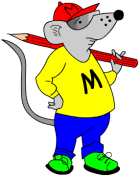 Probably one of the least understood of maths concepts, especially with young children.
Probably one of the least understood of maths concepts, especially with young children.
Children should be able to say whether events are impossible , unlikely , likely or certain.
They should also be able to say which events have an even chance of happening (such as tossing a coin and getting a head), but they should be careful not to say that if there are two possibilities, they are equally likely. For example, there are two possibilities – I might buy a new BMW today or I might not. Unfortunately, these two events are not equally likely. Another example of this is I choose a number between 1 and 5. Is the number I choose a prime number? As there are three prime numbers between 1 and 5 (2, 3 and 5) and two numbers that are not, there is not an even chance that I will choose a prime number.
Sometimes further investigations have to be carried out before a probability question can be answered. Take the possibility of a factor of 16 being even. The only way of doing this is to first find all the factors of 16, group them into even or odd and then work out the probability.